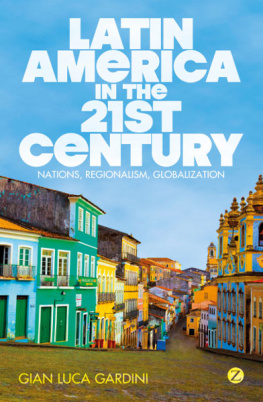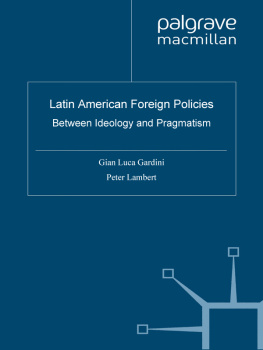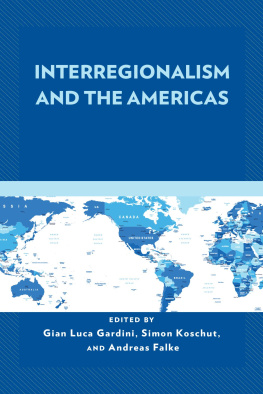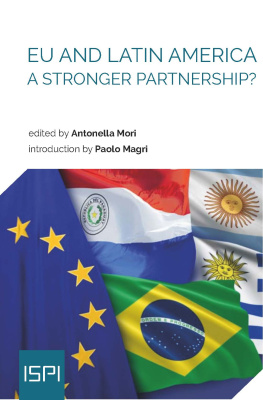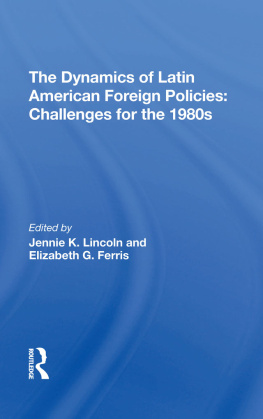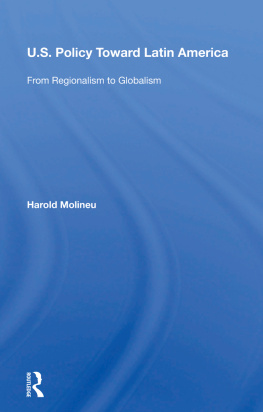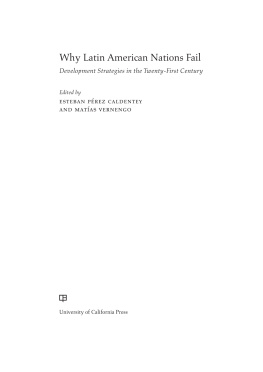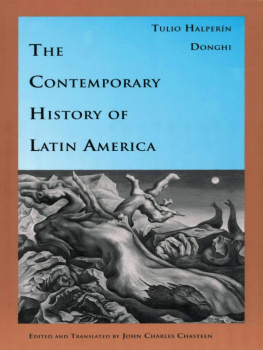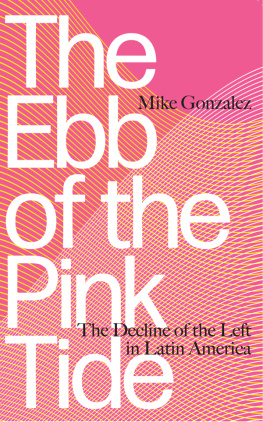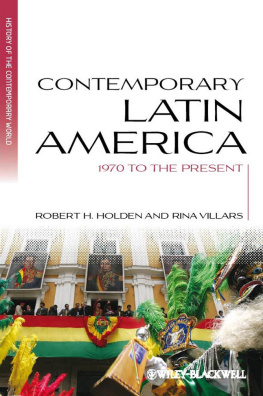Latin America in the 21st Century: Nations, Regionalism, Globalization was first published in English in 2012 by Zed Books Ltd, 7 Cynthia Street, London N 1 9 JF , UK and Room 400, 175 Fifth Avenue, New York, NY 10010, USA
Originally published in Italian in 2009 under the title LAmerica Latina nel XXI secolo by Carocci Editore S.p.A., Via Sardegna 50, 00187 Roma, Italia
www.zedbooks.co.uk
Italian edition 2009 Carocci Editore S.p.A., Roma
English-language translation Gemma Brown, 2012 www.gemmabrown.com
The right of Gian Luca Gardini to be identified as the author of this work has been asserted by him in accordance with the Copyright, Designs and Patents Act, 1988
Set in Monotype Sabon and Gill Sans Heavy by Ewan Smith, London
Index: ed.emery@thefreeuniversity.net
Cover designed by Rogue Four Design
Cover photo Getty Images/Tom Till
Printed and bound by CPI Group (UK) Ltd, Croydon, CR0 4YY
All rights reserved. No part of this publication may be reproduced, stored in a retrieval system or transmitted in any form or by any means, electronic, mechanical, photocopying or otherwise, without the prior permission of Zed Books Ltd.
A catalogue record for this book is available from the British Library
Library of Congress Cataloging in Publication Data available
eISBN 9781780322568
Introduction
Latin America is a vast, diverse and marvellous continent, rich in history, culture, and political and social experimentation. It is also, along with the wider world, going through a phase of transition. Categories and concepts that have traditionally been employed to study the continent, such as underdevelopment, poverty, dependency, left and right, East and West, no longer capture appropriately the complexity and evolution of present-day Latin America. They need to be discussed and redefined in the light of the new context and challenges of our times. There is hardly an unequivocal definition or uncontested notion of what Latin America is today.
The very concept of Latin America itself is under strain. Mexico, Central America and the Caribbean increasingly gravitate to the orbit of the United States. Conversely South America seems to be distancing itself from the North and emerging as a region of its own, with giant Brazil offering a kind of ambiguous leadership to this project. But even this shift is far from uncontested, steady or irreversible. Latin America remains a resilient, although heterogeneous, cultural and political concept as well as a useful analytical category.
The reading of twenty-first-century Latin America that this book proposes is one of nuances and dilemmas rather than one of established interpretations and linear trajectories. The book is structured according to three levels of discussion: the states, the region, and Latin America in the world. Some of the issues discussed are peculiar to one nation or a group of countries. There are other significant features that broadly characterize the Latin American region as a whole or subregions within it. Finally there are developments in the international relations of Latin America and the place it occupies on the world stage. At each level twenty-first-century Latin America displays, and often struggles with, three major tensions.
First, there is a tension between rhetoric and pragmatism, or more widely between ideology and pragmatism. These are not incompatible and a surge in both has recently taken place. This is particularly evident at the level of individual states and administrations in Latin America. This tension partly explains the coexistence of apparently divergent, if not contradictory, political and economic choices and stances, such as the strongly anti-US rhetoric of Venezuelan president Hugo Chvez and the close commercial links between the two countries, or the combination of former president Lula of Brazils strong social commitment and his extremely orthodox and conservative economic policy. In the first decade of the twenty-first century, a period of transition, the quest for new ideals, recipes, flexibility and adaptability in fact reveals a pragmatic approach to the situation rather than fundamental incoherence.
A wholesale rejection of globalization or isolation from its effects would be impossible: there is too much interdependence in the areas of politics, economics, society, the environment and culture. What is possible, however, is the combination of economic openness and social policies, a good neighbour foreign policy and national interests and cultural identity, and sustainable economic development and local needs. The lively and deeply ideological rhetoric which has always been a characteristic of Latin American politics seems, at this juncture in history, to blend well with rediscovered pragmatism. On the one hand, the rhetorical emphasis helps to draw attention to certain issues and, possibly, to reach pragmatic results. On the other hand, pragmatism allows for the negotiation of solutions with fundamentally ideological aims. Rhetoric is not an end in itself, but it does serve specific national interests. Pragmatism highlights the limits and restrictions which exponents of an excessively ideological approach could face in an increasingly interconnected and interdependent world, characterized by a plethora of actors, interests and issues on the agenda, domestically, regionally and internationally.
Secondly, a tension between unity and diversity is plainly visible. Latin America is often considered a single entity, but its diversity is at least as great as that of the European continent. The differences between a Chilean and a Colombian are just as obvious and profound as those between a Finn and a Spaniard. Even within the same country, highly varying economic, social and cultural realities can be found. For example, Brazil is home to both a south which closely resembles Europe and the proudly black African Bahia region; both the skyscrapers and financial quarters of So Paulo and the extreme poverty and backwardness of some areas in the north-east. The concept of Latin America is elusive and heterogeneous not only culturally, but also in terms of its geography. The definition Latin, for instance, does not cover indigenous populations. French-speaking Quebec in Canada is not associated with the Latin part of the continent, while English-speaking Belize or Dutch-speaking Caribbean islands are generally included in the definition. Nonetheless, Latin America is a universally accepted term and Latin Americans are proud to call themselves nosotros los latinos . Above all, the Latin part of the Americas stands as a counterpoint to its other, namely North America: the United States and Canada. It is perhaps little wonder that this variety translates into a wealth of differing mindsets, histories and ideas between and within nations.
Despite their differences, Latin American countries share a number of traits. No single country is yet fully part of the so-called industrialized world, despite advances in Brazil rapidly moving the country towards achieving world power status. Latin American countries have long been, and for the most part remain, highly dependent on global markets, especially in the domains of raw materials and foodstuffs. They all fall to a larger or lesser extent under the sphere of influence of the United States, a country which has played a fundamental role in their history. Whats more, all of these countries have roots in Western civilization: the conquistadores managed to impose not only their political regime but also their language, religion and values. Finally, Latin American countries share a similar social structure, with a focus on landownership, a unique form of modernization characterized by delayed but accelerated industrialization, and socio-economic disparity. These remarks provide a snapshot of the tensions between unity and diversity in twenty-first-century Latin America. This is epitomized by the number of regional integration projects purportedly pursuing continental unity. Their variety in membership, rationale, and political and economic proposals is in fact a stark reflection of diversity and heterogeneity.

